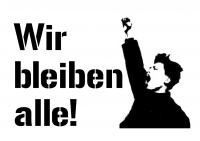Sunday, 23 March 2014. At 6 PM, a group of activists from Lampedusa in Hamburg (LiH) reported on their experiences with the senate in Hamburg at Oranienplatz to almost 30 members of Lampedusa in Berlin (LiH). They said that the refugees in Hamburg who accepted Duldung (suspended deportation) did not do it by choice, but because they were forced by the Hamburg police, who regularly arrests Africans on the street.
The police took fingerprints and photos of the refugees who had to apply for Duldung in Germany. By starting asylum cases in Germany (which are usually rejected), these refugees lost their Italian papers, because it is not possible to have papers from two different countries. One LiH speaker said not to believe the "politician talk." Duldung gives no legal security at all and is just a trick to deport people quietly, one by one.
"It is like you are awaiting trial in prison," said the LiH speaker, "what we need is the right to stay and the right to work. I don't care how they do it or if it's possible."
He emphasized how important Oranienplatz is as a place of struggle: "You are on CNN, you are on BBC, on Al Jazeera. You are an embarrassment for them. They want you out by all means."
He also called for more cooperation: "[The Senates of] Berlin and
Hamburg are working together, so we should also work together."
Another LiH speaker concluded: "I am in Europe three years, nothing changed, but if God will... We have to continue struggling!"
Throughout the speech, about five members of LiB, who still hesitate to
disappoint Senator Kolat, sat on a bench some meters away from the
meeting while the LiH refugees spoke.
After the speech, the LiB sceptics walked into the circle. One asked: "Do you want us to sleep out here even longer?" "You
can accept the offer or not, I'm just telling you what happened in
Hamburg," repeated the LiH speaker.
A loud discussion started, but the LiH delegation gave their best to calm the worries. The meeting ended in good spirits.
The report from Hamburg forces us to doubt Senator Kolat's "kind"
offer. We cannot trust her good promises, but we can trust the bad
experiences of other refugees. Why does the police in Hamburg have to force people to accept Duldung,
while Kolat sells it to the public as an "agreement"? Why does she not
even speak of Duldung, but use the words "comprehensive revision of
individual cases"?


Interessanter Text
Ist doch schon
Unter dem Artikel ist ein Link: "Deutsch". ;-)
winzig